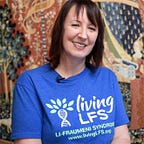People with a new Li-Fraumeni Syndrome diagnosis regularly join our private Facebook group feeling overwhelmed, fearful, scared and sad, looking for support. And no wonder — being given such seemingly hopeless news is emotionally traumatic. My first post to the support group, 9 days after my LFS diagnosis, was completely devoid of emotion. I just wanted answers about treatment for breast cancer with LFS. It took a long time for me to fully acknowledge the lifelong impact LFS would have on me.
The genetic counselor I was assigned to when I was diagnosed with breast cancer was clearly passionate about genetics. She found my family history fascinating and said it sounded like Li-Fraumeni Syndrome within minutes of meeting me. She was excited and animated as she explained germline, somatic, missense, nonsense… concepts that mostly went over my head. She seemed like a knowledgeable and friendly high school teacher who wasn’t particularly good at teaching. To me, this genetic stuff sounded like interesting information, but not much more than that — it felt like a science project, or researching my genealogy. Not like something that would change and likely shorten my life. Even as I sat there. Having. Breast. Cancer.
A lot was happening when we had that initial genetics discussion. I was dealing with my new cancer diagnosis and making immediate treatment decisions — yes to lumpectomy and radiation, no to mastectomy or chemo — and the genetic counselor impressed upon me several times that I didn’t have to make the decision to have genetic testing now. So I didn’t. She may have mentioned that people with LFS were more sensitive to radiation, but somehow I didn’t make the connection that that would affect whether or not I chose to treat my current, existing cancer with radiation. It was more than a month later, after I’d already had the lumpectomy and was getting ready to sign up for radiotherapy, that I decided I wanted to know if I had any genetic mutations after all. Maybe the things I’d learned were starting to seep in.
When the genetic counselor confirmed I had Li-Fraumeni Syndrome, my first thought wasn’t horror or fear or sadness. It was, “How fascinating. That explains a lot.”
I opted to have chemotherapy and not to have radiation. I’m shocked that the diary I kept during chemo makes no mention of LFS at all. I was apparently laser-focused on the shark closest to the boat — dealing with the breast cancer.
Perhaps I understood all of the genetic counselor’s words, but refused to immediately accept their full meaning in order to save myself from the kind of mental anguish I experienced after gall bladder surgery. Perhaps I unconsciously decided to take the full weight of the diagnosis a little at a time, only as I was emotionally equipped to handle it. To this day, I still refuse to have a mastectomy, though it would dramatically reduce my risk of future breast cancer. I fully comprehend the risk. I do. But as anyone with LFS knows, every decision is complicated and very personal.
It was weeks after my LFS diagnosis before I made any acknowledgement of the emotional impact of LFS in the support group. I posted this image, a quote by psychiatrist and Holocaust survivor Viktor Frankl:
I just found (thanks, internet) that the full quote from Viktor Frankl reads, “We must never forget that we may also find meaning in life even when confronted with a hopeless situation, when facing a fate that cannot be changed. For what then matters is to bear witness to the uniquely human potential at its best, which is to transform a personal tragedy into a triumph, to turn one’s predicament into a human achievement. When we are no longer able to change a situation — just think of an incurable disease such as inoperable cancer — we are challenged to change ourselves.“
I have changed. I view life though the lens of LFS. I have a permanent feeling of impermanence. At nearly 45 years of age, I constantly think of my grandmother and great grandmother, who died of breast cancer at 34 and 47, respectively, and wonder if I’ll make 50.
What Do I Do With This Life? What Can I Do?
Three years after being diagnosed, I’m still learning what it means to have Li-Fraumeni Syndrome.
I know I can help others who have the same story. I can tell the people that have a family history of cancer, but don’t know anything about their genetics, to consider genetic testing before they get cancer, so they can be in control. I can share my experiences with the people who have just been diagnosed, who are just starting down the road I’ve already been down. And I can keep learning from those who are further down the road.
